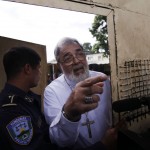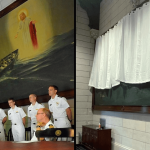Each week in Citizenship Confusion, Alan Noble discusses how we confuse our heavenly citizenship with citizenship to the state, culture, and world.
When the State announced that it would no longer include prayer during the graduation ceremony at Liberty High School in Pickens County, South Carolina, Roy Costner IV, a valedictorian, took matters into his own hands. The local school district had received complaints from the Freedom From Religion Foundation about school sponsored prayer in the district and was concerned that FFRF and the ACLU might cause problems if they continued to allow prayer at graduation, so they banned it.
According to the Christian News Network, however, “Costner IV wasn’t going to let activist groups kick God out of his graduation. After taking the podium, Costner took his approved speech and ripped it in half for all to see.” To great applause, Costner IV said the Lord’s Prayer in an act of defiance against the forces of secularism:
Costner IV’s story has become an evangelical Internet sensation, and the video of his speech has received over 200k views in three days. He and his father will be interviewed on CNN in the coming days. In a society that seems increased antagonistic to the Christian faith, and under a government which some see as systematically oppressing Christianity, Costner IV has been hailed as a hero of the faith.
But is he? Was his act of defiance a bold stand against secular intolerance, or could it have been an instance of blindness toward Christian privilege?
When the Pickens County School District chose to end graduation prayers in response to threats from “activist groups,” it ended school sponsored prayers, which is commonly seen as a violation of the establishment clause. Allowing the State to use Christian prayer in an official capacity can be easily interpreted by citizens as the endorsement of a particular religion, and indeed, the SCOTUS has strongly decided against school sponsored prayer based on this interpretation of the establishment clause.
However, it does seem that the school district also chose to forbid any prayers, even unofficial, unscheduled, unsponsored ones, a policy which debatably infringed upon Costner IV’s rights. According to him, he was explicitly told by his principal not to mention any God in his speech: “She informed us that we could not have anything about religion or talk about God or Allah or whoever we choose to worship.”
Had Costner IV prayed in defiance of the prohibition against any religious references in the graduation speeches, then it would be right for us to support him and his actions. However, according to a CNN report and Christian News Network, his prayer was a protest against the removal of prayer from school in general, including the official, school sponsored prayers:
What he believes is that Liberty, a town with three stoplights and a population of 3,000, “fully supports prayer.” He also believes that organizations such as the Freedom From Religion Foundation . . . should stop meddling in the affairs of the Pickens County School District. The foundation, over this past school year, has leaned on the district to keep Jesus and student-led prayers out of school board meetings.
Costner said he set out to make a statement, one he hopes will inspire others to stand up, too, for what he sees as the good of this country.
“Taking prayer out of schools is the worst thing we could do,” he said.
Costner IV’s protest, then, was not just about his right to share his love for The Lord in his speech, but about allowing public schools to lead official Christian prayers. And it is there where I believe his complaint becomes flawed.
Should Christians Support Public Prayers?
Last year, Drew Dixon wrote a wonderful CAPC feature on a similar controversy over a school district that was forced to end prayers at football games. They also were pressured by the FFRF. In that piece, Drew rightly pointed out the uncharitable assumption which drives the idea that Christian prayers should have an official role in State functions:
The Bible envisions public prayers being offered in the context of local churches because prayer is a theological activity. When we pray to God out loud in church we are expressing what we believe about Him, about His kingdom, and about our place in it. Our corporate prayers teach doctrine and the New Testament is clear that Christians must teach sound doctrine (1 Timothy 1:10, 6:3; Titus 1:9) Thus the local church is an appropriate place for corporate prayer because those who pray are held accountable by the church. They submit to the church’s statement of faith, membership covenant, and leadership. For example, if a member of my church were to pray to Allah in one of our services, we would have reason and grounds to correct this person. Such a prayer clearly goes against our statement of faith and our membership covenant requires us to offer correction.
. . .
Nowhere does the Bible call Christians to pray at government sponsored events. The Bible calls us to proclaim the gospel on street corners and in center of towns and everywhere we go, but it never requires that we force the government or anyone else to publicly honor our religion.
I strongly encourage you to read the entirety of Drew’s piece as it very thoughtfully explores the issue of civic prayers at school functions and shows how misguided it can be for us to fight for them.
Then there is the separate issue of our assumption that it is normal and appropriate for the government to use Christian prayers. Let’s be honest, if a school district in Michigan had officially led Islamic prayers as a part of their graduation, we evangelicals would be citing this as an example of creeping shariah law and would demand an end to the prayers. And it would be reasonable for us to oppose such prayers, just as it is reasonable for the FFRF to ask that the public school not open their ceremonies with a Christian prayer.
There is a blindness here to Christian privilege, an assumption that Christians, and really only Christians, ought to be able to receive State sponsorship. Since Christianity has received privileged status in our government and society from its inception, we assume that we deserve to have continued dominance. So, when a group like FFRF calls for the end of school sponsored Christian prayer, we arrogantly view ourselves as persecuted.
But there is a deeper concern here: Once you allow the secular State to use the Christian faith in their machinations, it is inevitable that the manifestation of that faith will be stripped of its prophetic, power, turning it into blasphemy. I have written about this phenomenon in the past, looking at how the outrage over Obama’s failure to thank God during his Thanksgiving speech was misguided:
Most manifestations of Christianity within American politics amounts to little more than [philosopher Charles] Taylor’s [idea of] ‘vestigial ritual or prayer’ — empty religious gestures meant to appeal to certain patriotic images of a Christian Nation. But what is ironic is that it is precisely these empty symbols that Christians often defend vigorously.
Knowing that the State does not share the same King as we do, should we truly fight for State sponsored prayer? I am reminded of a comment Stanley Fish made in the New York Times regarding the effects of defending crosses on public land, a related issue of civic displays of Christianity:
It is one of the ironies of the sequence of cases dealing with religious symbols on public land that those who argue for their lawful presence must first deny them the significance that provokes the desire to put them there in the first place.
Aside from these more political concerns about sponsored graduation prayers, I have some theological objections. Costner IV’s prayer made little sense in the context of graduation except as an act of protest, a statement that activists should not “meddle . . . in the affairs of the Pickens County School District.” From the cheers and Costner IV’s tone, I worry that he was not really praying, but politically protesting. When prayer is reduced to a political protest in order to defend our right to pray to God in public, is it truly worth fighting for?
To the extent that he was protesting the principal’s restriction upon his freedom of speech, I sympathize with his action, although I would argue that using prayer primarily as a political tool is inappropriate. But since he was also objecting to the ban on school sponsored prayers, Costner IV was also protesting a relatively trivial restriction upon Christianity’s long history of political privilege and coopting by the State.
As secularism continues to gain prominence in our government, it will be critical for Christians to think carefully about what battles are appropriate, what stands are worth taking, what actions are heroic. Not all restrictions on our ability to pray and speak about God in public are wrong. In this instance, I believe it was wrong for the school to forbid Costner IV from mentioning God during his speech, but insofar as it was political protest against a ban on school sponsored prayer, I believe it was misguided and blind to Christian privilege.















